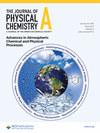揭示电子自能与耦合团双元理论之间的关系。
IF 2.8
2区 化学
Q3 CHEMISTRY, PHYSICAL
引用次数: 0
摘要
通过引入粒子-空穴-时间解耦的电子自能,导出了耦合双团(CCD)振幅方程。结果表明,基态相关能的表达式与耦合簇双重理论的表达式完全一致。我们在保持粒子-空穴可分离性的同时,通过耦合逆时自能贡献,证明了与电离势/电子亲和运动方程耦合簇双(IP/EA-EOM-CCD)特征值问题的关系。通过哈伯德二聚体的精确解证明了所建立的正式关系。本文章由计算机程序翻译,如有差异,请以英文原文为准。
Uncovering Relationships between the Electronic Self-Energy and Coupled-Cluster Doubles Theory
We derive the coupled-cluster doubles (CCD) amplitude equations by introduction of the particle-hole-time decoupled electronic self-energy. The resulting analysis leads to an expression for the ground-state correlation energy that is exactly of the form obtained in coupled-cluster doubles theory. We demonstrate the relationship to the ionization potential/electron affinity equation-of-motion coupled-cluster doubles (IP/EA-EOM-CCD) eigenvalue problem by coupling the reverse-time self-energy contributions while maintaining particle-hole separability. The formal relationships established are demonstrated by exact solution of the Hubbard dimer.
求助全文
通过发布文献求助,成功后即可免费获取论文全文。
去求助
来源期刊

The Journal of Physical Chemistry A
化学-物理:原子、分子和化学物理
CiteScore
5.20
自引率
10.30%
发文量
922
审稿时长
1.3 months
期刊介绍:
The Journal of Physical Chemistry A is devoted to reporting new and original experimental and theoretical basic research of interest to physical chemists, biophysical chemists, and chemical physicists.
 求助内容:
求助内容: 应助结果提醒方式:
应助结果提醒方式:


